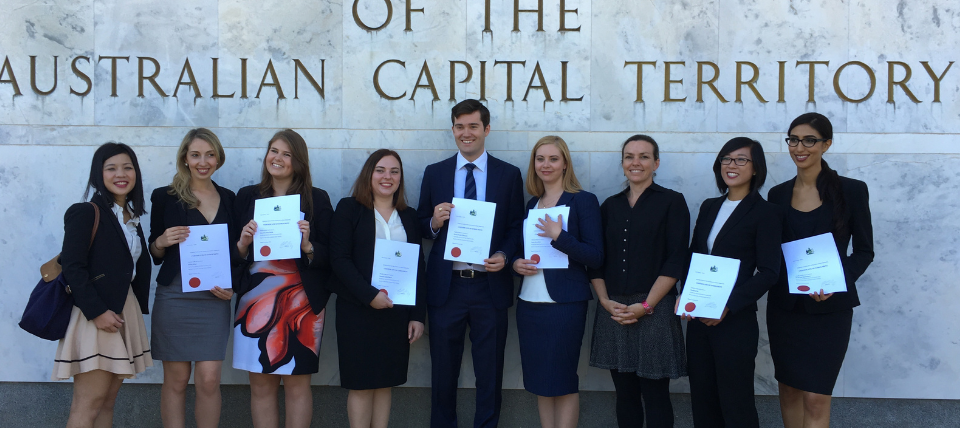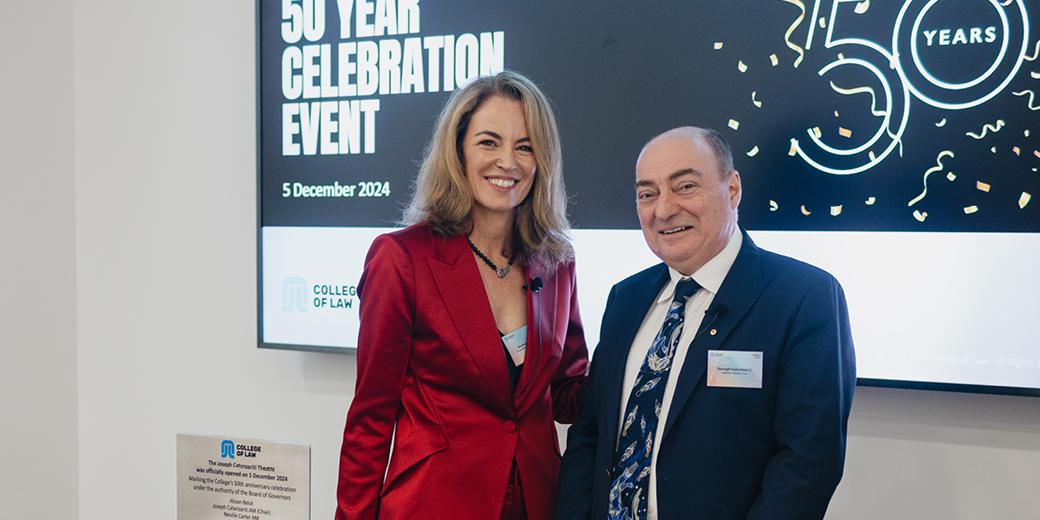The law is an exciting and surprisingly diverse profession.
Whether you’re a graduate or experienced lawyer, you can work in all sorts of roles and environments – from small businesses, traditional firms and the courts, to big organisations, government departments and community centres.
Below is an overview of the legal landscape and the different directions you may follow.
Solicitor
A solicitor is typically the first point of contact for a person seeking legal advice. Their responsibilities often include:
- Advising clients about their legal rights and obligations
- Assisting corporations and other organisations with compliance
- Preparing legal documents (including wills and contracts)
Most lawyers begin their career in this role. This is because it opens many opportunities, acting as a launching pad for other career pathways.
Thinking about working as a solicitor? A good tip is to consider the type and size of practice you want to work in, as this will impact your day-to-day experience.
What's The Difference Between A Solicitor And A Lawyer?
Good question. These terms are often used interchangeably. However, there is a key difference.
In short, a lawyer is a person with a certificate to practise law. This includes solicitors, barristers, judges and corporate counsels.
A solicitor, on the other hand, is a person with a practising certificate who is not a barrister or judge.
Type of Firm
Private practice
A private practice can be small, medium or large – and it can be based in the country, suburbs or city.
Each type of firm has different opportunities, so you need to clarify your objectives before choosing where to work.
A solicitor’s career path in private practice typically looks like this:
- Practical Legal Training
- Employed solicitor
- Associate
- Senior Associate
- Partner
Sole practices
Unlike other law firms, sole practices have one principal solicitor who owns the practice and employs other solicitors and staff.
Sole practices make up a large percentage of law firms.
Because of the small size of these practices, you are likely to obtain very broad, hands-on experience.
Dreaming of becoming a sole practitioner one day?
You may need to undertake a Legal Practice Management Course to satisfy the requirements of the local Law Society in your state.
Regional firms
Regional firms generally offer opportunities not available in city law firms – partly to attract quality employees.
For example, a regional firm will likely give you:
- More flexible working hours
- More direct and personal relationships with clients
- A wider variety of work
- A faster track to partnership
Size of Firm
Small firms
With just two to five partners, a small firm will expose you to every area of law that the firm specialises in.
As a graduate lawyer in a small firm, you are likely to have almost immediate responsibility for client briefs – giving you more experience more quickly than at a larger firm.
Medium firms
With six to 20 partners, medium firms have a broader range of work than small firms and sole practices – but often in more specialist areas.
Generally, the larger the firm, the more specialised your work.
However, you may be able to move from one practice area to another within a medium firm (e.g. from litigation to corporate law).
Large firms
Large firms have more than 20 partners. They often have very structured recruitment, induction and training programs and complex hierarchies.
Many large firms also run ongoing legal education and training programs, and offer pro-bono initiatives.
Compared to smaller firms, large firms tend to offer a wider spectrum of practice areas – especially in commercial law.
Barrister
Barristers are members of the Bar and represent clients in court. They usually receive work by referral from solicitors.
Barristers are generally required to:
- Have a sound knowledge of the rules of evidence and court procedure
- Determine the appropriate strategy and arguments to be presented in court
- Give advice on matters of law within their expertise (verbally or in writing)
As a barrister, you’ll be an independent legal practitioner – and will not work for a firm or in partnership with other barristers.
However, you may choose to share chambers (in the same building or floor) with other barristers to save on costs relating to legal secretaries and clerks.
Each state and territory has a Bar association that prescribes its own practising requirements for barristers.
The Courts
Although you may aspire to become a judge or magistrate one day, there are many other rewarding roles within the court system – such as a judge’s associate.
As a judge’s associate, you’ll act as an assistant to the judge. You will prepare and maintain paperwork, undertake research for cases and liaise with other court staff to schedule hearings and set trial dates. You will also sit in court with the judge.
Judge’s associate positions are generally not advertised and can be very competitive. So if you hear of a vacancy, be sure to submit your resume immediately (directly to the court concerned).
Other support staff roles in the courts include:
- Registrars
- Legal assistants
- Law clerks
- Legal executives
In-House Lawyer or Counsel
As an in-house lawyer or counsel, you will provide legal advice to the corporation you work for. You will be expected to:
Hold expertise in your employer’s area of business
Manage corporate risk and compliance
Manage change within the organisation
Bring in external counsel where necessary
In-house roles often cover many different areas of law – unlike private practice where the work tends to be more specialised.
Another key role is company secretary. This is often held by someone with legal qualifications.
Newlaw Careers
The legal landscape is changing at a rate never seen in history. The legal ecosystem is complex, multidisciplinary and continually evolving. Contemporary legal practice is about new law, new professions and specialisms, new areas of practice, and new ways of solving new and different legal problems.
But it is often difficult to find out about these new types of legal careers. In a world first the College of Law in collaboration with the Centre for Legal Innovation and Forage have launched NewLaw Careers virtual internships featuring five NewLaw careers:
- Legal Operations Professional
- Legal data Analyst
- Legal technologist
- Legal Knowledge Manager
- Family Law Mediator
NEWLAW CAREER VIRTUAL INTERNSHIPS
Want to try before you apply – and sharpen your legal skills while you’re at it? Complete a (free) virtual internship in five in-demand NewLaw careers.
Community Legal Centres
Community Legal Centres (CLCs) are not-for-profit organisations that advocate for equitable access to the justice system in Australia. CLCs:
- Provide free legal advice, casework and information to the disadvantaged and to those with special needs
- Deliver community development services to local or special interest communities
- Promote law reform and conduct test cases where laws are operating unfairly or are unclear
CLCs often offer PLT placements but also have roles for admitted lawyers.
Government Lawyers
Many interesting legal roles exist in government departments, statutory authorities and regulatory bodies. Both federal and state public services have regular graduate intakes – with opportunities in legal, policy, research and advisory positions.
To find jobs in the government sector, you can:
- Check the Australian Public Service website
- Check each individual government department website
Federal Government Departments That Recruit Lawyers
- Attorney-General’s Department
Delivers programs and policies to maintain and improve Australia's law and justice framework. - Administrative Appeals Tribunal
Conducts independent merits review of administrative decisions made under Commonwealth laws. - Australian Communications and Media Authority
An independent statutory authority that ensures Australia’s media and communications legislation operates effectively, efficiently and in the public interest. - Australian Competition and Consumer Commission
Promotes competition and fair trade to benefit consumers, businesses and the community. - Australian Criminal Intelligence Commission
Works with law enforcement partners to improve the ability to stop criminals exploiting emerging opportunities and perceived gaps in law enforcement information. - Australian Government Solicitor
A group within the Australian Government Attorney-General’s Department that provides legal services to government – a role that it has fulfilled since Federation. - Australian Human Rights Commission
Leads the promotion and protection of human rights in Australia. - Australian Institute of Criminology
Australia’s national research and knowledge centre on crime and justice that aims to promote justice and reduce crime. - Australian Law Reform Commission
A federal agency that reviews Australia’s laws to ensure they provide improved access to justice for all Australians. - Australian Prudential Regulation Authority
Oversees banks, credit unions, building societies, general insurance and reinsurance companies, life insurance, private health insurance, friendly societies and most members of the superannuation industry. - Fair Work Commission
Australia's national workplace relations tribunal. - Family Court of Australia
Assists Australians to resolve complex legal family disputes. - Federal Court of Australia
The Court is a superior court of record and a court of law and equity. - Commonwealth Director of Public Prosecutions
An independent prosecution service established by Parliament to prosecute alleged offences against Commonwealth law.
Public Notary
A public notary is a senior lawyer responsible for certifying and attesting documents intended for use anywhere in the world.
In this role, you’ll be granted a number of statutory powers and carry out administrative tasks.
Your key responsibilities will include:
- Attesting documents and certifying their due execution for use in Australia and internationally
- Preparing and certifying powers of attorney, deeds, wills and contracts
- Administering oaths for Australian and international documents
- Witnessing signatures to affidavits, statutory declarations and powers of attorney
- Noting and protesting bills of exchange
To become a public notary, you must:
- Be a natural person
- Be an Australian lawyer
- Have held an Australian practising certificate for a five-year period
- Have completed a course of study related to notarial practice
Family Dispute Resolution Practitioners
Want to work outside the adversarial legal system?
As a family dispute resolution practitioner (FDRP), you will combine mediation with empathy to help families reach their own agreements.
FDRPs aren’t qualified lawyers. They can come from a variety of backgrounds including law, social work, psychology and dispute resolution.









































































